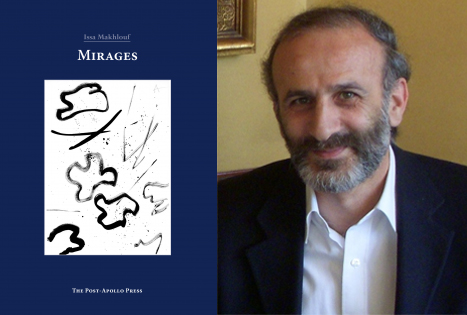Author Issa Makhlouf
Mirages
By Issa Makhlouf, translated into English by Alicia F. Lam
The Post-Apollo Press, 2015
Issa Makhlouf, an expatriate poet, possesses an anthropologist’s eye, a philosopher’s soul, a journalist’s sense of detail – and a heart rooted in the mountains and valleys of Lebanon. A long-time resident of Paris, where he earned a doctorate in Cultural Anthropology from the Sorbonne and works as News Director at Radio Orient, Makhlouf has written 11 books.
In “Mirages” (published in Arabic in 2000, and translated into French in 2004), Makhlouf employs a series of striking prose poems that include both realistic and aphoristic elements, like dreams. Not merely an optical illusion, a mirage offers the viewer something he desperately wishes to be true. Makhlouf’s meditations on fine art, romantic and familial love, war, loss, and death, as well as the sacrifice and transcendence exemplified by the lives of saints, unite to create a rich, alternative world.
Yet in a mirage – as in art – many things shimmer at or beyond the range of imagination. Makhlouf begins this book with a brief riddle of a dedication:
What I tell today are stories that I wanted to hear from someone.
What I tell is only a part of what I have not seen.
Had I seen, I wouldn’t have told.
Makhouf divides “Mirages” into two main sections. The first contains five subsections, in which the speaker moves between contemporary Europe, his Lebanese childhood, and his subsequent departure in a time of war. The second contains five meditations on the lives of saints, two Sufi Muslims and three Christians: Al-Hallaj, Rabi’a al-’Adawiyya, Francis of Assisi, Teresa of Avila, and Simeon Stylites.
A difficult poet to excerpt, Makhlouf created most of the poems in “Mirages” to run from two to four pages in length, with each flowing beautifully from start to finish (with the assistance of translator Alicia F. Lam). The following passages may give the reader a flavor of his work. In the Borges-inflected “Beyond Sight,” a young man who awakes blind after reading “A Thousand and One Nights” becomes a mystical poet:
…He observed the first letter of the alphabet for so long that he managed to see the sun. He tried to express this vision. So he wrote a poem that made no sense, like all great poems, because the poem submerges itself in the mystery of the world, intends to express nothing. There, the Aleph is the solar disc. A window over the infinite blueness. The window opens for Him.
In “The Corpse’s Dream,” the speaker returns to his youth and the nightmarish days of the Lebanese Civil War, recalling in surreal, cinematic detail:
…I have seen piles of corpses being kicked by exhausted combatants. They kicked the heads of the corpses, whose extremities could not fit in the trucks that drove through the streets followed by a crowd, as in a procession. As the trucks passed, women made the sign of the cross, standing in their houses surrounded by their children. A woman held an image of the Virgin Mary, which she removed from the wall of her living room. Waving the image from left to right, she stopped for a moment to begin her prayers, screaming and howling. Meanwhile, the elderly came out of their houses, astonished, silent, hypnotized, holding candles that revealed the features of their worried faces.
Makhlouf ends “Mirages” with a meditation on St. Simeon Stylites, whose extreme asceticism led to his expulsion from a monastery, and his creation of a singular form of immobility and transcendent mobility – born from a fierce yearning for God – not unlike that of an obsessed artist:
…One day, a passer-by saw me. I, escapee from the world. Astonished, he told his friends and family about me. They began to pour in, one after another, surprised in turn, they recounted what they saw to anyone they met. Some were shocked when they saw me and thought I was crazy. Others believed in me and came near me so that I would bless them. This happened every night and after the people were gone, I continued to build my column. As the number of people, some coming from distant towns, increased, the height of the column increased too, reaching seventeen meters. This column protected me from the numerous people searching for salvation.
***
Do you know the hunger of the cities? The hunger of the labyrinth that leads to neither land nor tree? A poor breast gives poor milk. The traveler travels alone. Facing the sky, he screams, “Where are You and what did You do? Why did You desert me? You, who give fire to volcanoes, give me something to calm my thirst. Give me a single moment of quietness and let it be as big as the earth and the world!”
In this poignant lament, Makhlouf expands his poetic vision to encompass the loneliness of the cosmos, which underscores the loneliness of the individual. “Mirages” is a deeply haunting work.
This review appeared in Al Jadid, Vol.20, No. 71, 2016.
© Copyright 2016, 2017 AL JADID MAGAZINE

